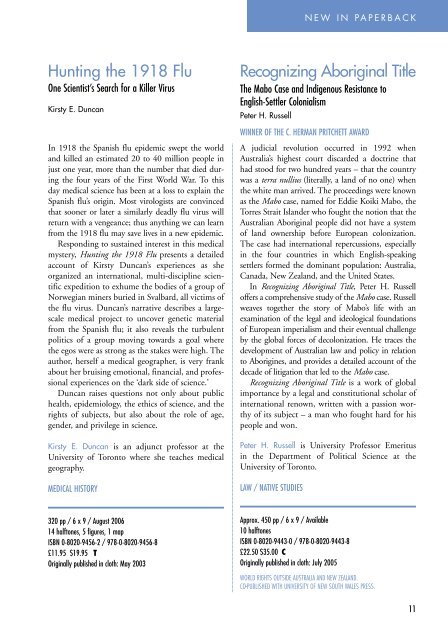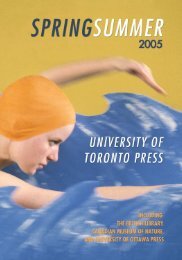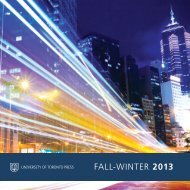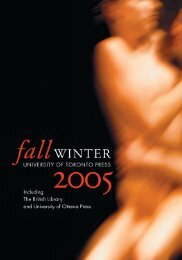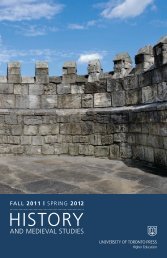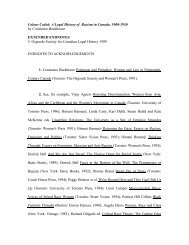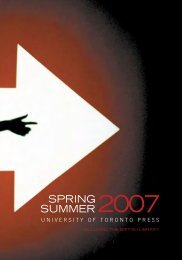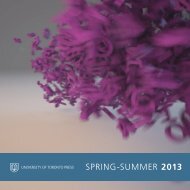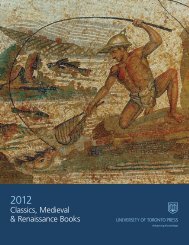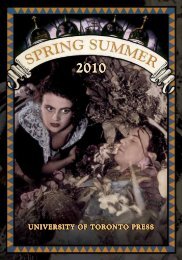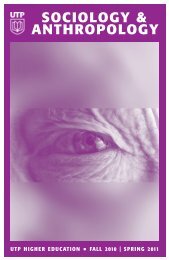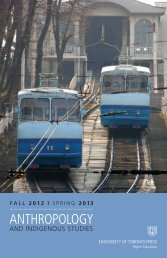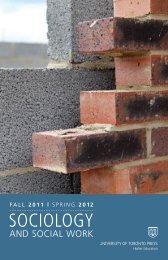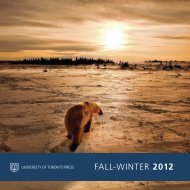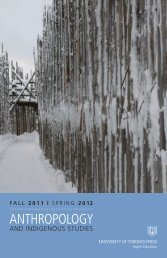Fall/Winter 2006 - University of Toronto Press Publishing
Fall/Winter 2006 - University of Toronto Press Publishing
Fall/Winter 2006 - University of Toronto Press Publishing
Create successful ePaper yourself
Turn your PDF publications into a flip-book with our unique Google optimized e-Paper software.
N E W I N PA P E R B A C K<br />
Hunting the 1918 Flu<br />
One Scientist’s Search for a Killer Virus<br />
Kirsty E. Duncan<br />
In 1918 the Spanish flu epidemic swept the world<br />
and killed an estimated 20 to 40 million people in<br />
just one year, more than the number that died during<br />
the four years <strong>of</strong> the First World War. To this<br />
day medical science has been at a loss to explain the<br />
Spanish flu’s origin. Most virologists are convinced<br />
that sooner or later a similarly deadly flu virus will<br />
return with a vengeance; thus anything we can learn<br />
from the 1918 flu may save lives in a new epidemic.<br />
Responding to sustained interest in this medical<br />
mystery, Hunting the 1918 Flu presents a detailed<br />
account <strong>of</strong> Kirsty Duncan’s experiences as she<br />
organized an international, multi-discipline scientific<br />
expedition to exhume the bodies <strong>of</strong> a group <strong>of</strong><br />
Norwegian miners buried in Svalbard, all victims <strong>of</strong><br />
the flu virus. Duncan’s narrative describes a largescale<br />
medical project to uncover genetic material<br />
from the Spanish flu; it also reveals the turbulent<br />
politics <strong>of</strong> a group moving towards a goal where<br />
the egos were as strong as the stakes were high. The<br />
author, herself a medical geographer, is very frank<br />
about her bruising emotional, financial, and pr<strong>of</strong>essional<br />
experiences on the ‘dark side <strong>of</strong> science.’<br />
Duncan raises questions not only about public<br />
health, epidemiology, the ethics <strong>of</strong> science, and the<br />
rights <strong>of</strong> subjects, but also about the role <strong>of</strong> age,<br />
gender, and privilege in science.<br />
Kirsty E. Duncan is an adjunct pr<strong>of</strong>essor at the<br />
<strong>University</strong> <strong>of</strong> <strong>Toronto</strong> where she teaches medical<br />
geography.<br />
MEDICAL HISTORY<br />
Recognizing Aboriginal Title<br />
The Mabo Case and Indigenous Resistance to<br />
English-Settler Colonialism<br />
Peter H. Russell<br />
WINNER OF THE C. HERMAN PRITCHETT AWARD<br />
A judicial revolution occurred in 1992 when<br />
Australia’s highest court discarded a doctrine that<br />
had stood for two hundred years – that the country<br />
was a terra nullius (literally, a land <strong>of</strong> no one) when<br />
the white man arrived. The proceedings were known<br />
as the Mabo case, named for Eddie Koiki Mabo, the<br />
Torres Strait Islander who fought the notion that the<br />
Australian Aboriginal people did not have a system<br />
<strong>of</strong> land ownership before European colonization.<br />
The case had international repercussions, especially<br />
in the four countries in which English-speaking<br />
settlers formed the dominant population: Australia,<br />
Canada, New Zealand, and the United States.<br />
In Recognizing Aboriginal Title, Peter H. Russell<br />
<strong>of</strong>fers a comprehensive study <strong>of</strong> the Mabo case. Russell<br />
weaves together the story <strong>of</strong> Mabo’s life with an<br />
examination <strong>of</strong> the legal and ideological foundations<br />
<strong>of</strong> European imperialism and their eventual challenge<br />
by the global forces <strong>of</strong> decolonization. He traces the<br />
development <strong>of</strong> Australian law and policy in relation<br />
to Aborigines, and provides a detailed account <strong>of</strong> the<br />
decade <strong>of</strong> litigation that led to the Mabo case.<br />
Recognizing Aboriginal Title is a work <strong>of</strong> global<br />
importance by a legal and constitutional scholar <strong>of</strong><br />
international renown, written with a passion worthy<br />
<strong>of</strong> its subject – a man who fought hard for his<br />
people and won.<br />
Peter H. Russell is <strong>University</strong> Pr<strong>of</strong>essor Emeritus<br />
in the Department <strong>of</strong> Political Science at the<br />
<strong>University</strong> <strong>of</strong> <strong>Toronto</strong>.<br />
LAW / NATIVE STUDIES<br />
320 pp / 6 x 9 / August <strong>2006</strong><br />
14 halftones, 5 figures, 1 map<br />
ISBN 0-8020-9456-2 / 978-0-8020-9456-8<br />
£11.95 $19.95 T<br />
Originally published in cloth: May 2003<br />
Approx. 450 pp / 6 x 9 / Available<br />
10 halftones<br />
ISBN 0-8020-9443-0 / 978-0-8020-9443-8<br />
£22.50 $35.00 C<br />
Originally published in cloth: July 2005<br />
WORLD RIGHTS OUTSIDE AUSTRALIA AND NEW ZEALAND.<br />
CO-PUBLISHED WITH UNIVERSITY OF NEW SOUTH WALES PRESS.<br />
11


